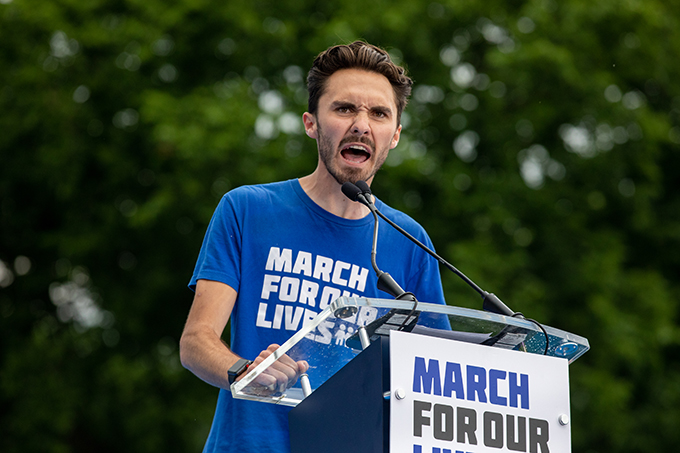On November 5, the Democratic Party received what counts in our hyper-polarized age as a comprehensive drubbing. Donald Trump swept all seven battleground states, improved over his 2016 and 2020 performances with nearly every demographic subcategory, and became the first Republican in 20 years to win the popular vote. In the end, Vice President Kamala Harris’s $1 billion-plus war chest and much-praised “ground game” proved a boon to the college funds of Democratic consultants and not much else. “This was a total and complete repudiation of the Democratic Party,” one congressman told Punchbowl News on the morning after the election. “People are not buying what we’re selling. Period.”
Postelection polling confirms that the party’s national brand is in the dumpster. A late January Quinnipiac poll found that only 31 percent of voters hold a favorable opinion of the Democrats, versus 57 percent with an unfavorable one. By contrast, Republican favorability stood at 43 percent—still underwater, but 12 points better—while Trump enjoyed the highest approval rating of his political career, 53 percent, according to a February poll from CBS/YouGov.
Finally, a reason to check your email.
Sign up for our free newsletter today.
While voters are undoubtedly angry at the party that gave us the Biden administration, surveys from Democratic polling firms suggest a broader public rejection of progressive cultural politics. According to an election postmortem by the Democratic polling firm Blueprint, published in mid-November, swing voters who broke for Trump—as 52 percent did, compared with only 36 percent for Harris—saw Democrats as being more supportive of immigrants than of American citizens (73 percent), wanting to “promote transgender ideology” (72 percent), being “too focused on identity politics” (67 percent), and having “extreme ideas” about “immigration” (69 percent) and “race and gender” (63 percent). The Progressive Policy Institute’s survey of working-class voters found that 68 percent of respondents said that Democrats had moved too far left, compared with 47 percent who said that Republicans had moved too far right.
This broad-based public exhaustion with cultural progressivism, seen not merely in polling but also in Trump’s newfound status as a cultural icon, seems to suggest that the Democrats’ best path forward is to ditch “wokeness” and pivot to the center. Several prominent Democrats have made just this argument. In a memo reported by Politico’s Jonathan Martin, Democratic donor advisor and Obama White House veteran Seth London said that his party’s rebrand should “begin with a complete rejection of race- and group-based identity politics,” a sentiment echoed by former Obama White House chief of staff Rahm Emanuel, who told Martin that “identity politics did not work electorally” and had “failed miserably strategically.” Michigan senator Elissa Slotkin—who, since entering Congress in 2019, has endorsed everything from childhood gender transitions to censorship—similarly told the Democratic Senatorial Campaign Committee in November that “identity politics needs to go the way of the dodo.” In January, she even managed to land a sympathetic profile in the Free Press, in which she pitched herself as a “radical pragmatist” and card-carrying member of “Team Normal.” And in March, California governor Gavin Newsom (the favorite in the 2028 Democratic primary, according to prediction market Kalshi) hosted MAGA influencer Charlie Kirk on his podcast, agreeing with Kirk that allowing biological males to compete in women’s sports was “deeply unfair.”
Party surrogates have been aggressive in taking aim at “the groups,” the sprawling network of progressive nonprofits and advocacy organizations that, under Biden in particular, assumed the role of the Democrats’ policy and intellectual vanguard. (As the Department of Government Efficiency has highlighted, many of these groups were not only powerful within the coalition; they were also being subsidized by taxpayers.) In an influential New York Times op-ed, the former Democratic Senate staffer Adam Jentleson urged Democrats to “declar[e] independence” from the groups, warning that they had become “disastrously cavalier about the basic realities of American politics.” In a November interview with the populist academic Michael Lind, Ezra Klein of the New York Times observed that both the governing style of the Biden-era Democratic Party and the 2024 campaign reflected “a culture in which nobody is saying no to the groups at any level of American Democratic politics.” Bloggers Noah Smith and Matthew Yglesias and former Obama speechwriter-turned-podcaster Jon Favreau have made similar points. In the immediate aftermath of November 5, the Left’s self-appointed reality-based community seemed to be orchestrating a sensible turn.
But abandoning identity politics—and the groups—is easier said than done.

Shortly after the election, Representative Seth Moulton of Massachusetts declared that the party needed to be “brutally honest” about how out of step its position on transgender issues was with the American public. As the father of two young daughters, Moulton told the New York Times, he agreed with the eight in ten Americans who do not want schoolgirls “getting run over on a playing field by a male or formerly male athlete.” The blowback was severe. Activists, spurred on by local Democratic officials and national journalists and nonprofits, accused Moulton of “scapegoating” trans people, descended on his office for a “Neighbors Against Hate” rally, and pledged to primary him in his next election. Moulton’s campaign manager and the director of his political action committee quit in protest of his remarks, and the chairwoman of the Salem Democratic City Committee denounced him in an e-mail as a “Nazi cooperator.”
The Democratic National Committee’s elections for a chairman this February, meantime, were vintage woke surrealism, straight out of 2020. The event featured a land acknowledgment, anti-Trump slave spirituals, and an announcement by outgoing chairman Jamie Harrison explaining how “nonbinary individuals” would get counted under rules mandating gender balance among DNC officers. The DNC elected as one of its vice chairmen the Gen Z professional activist David Hogg, whose X account over the past seven years reads like an AI-generated parody of elite progressive excess. Hogg had even posted in 2022 that “I’m one of the most politically toxic people in the country and I’m too radical for American politics,” suggesting that he had a more accurate view of political reality than the 2025 version of his party.
Identity politics has sway within the Democratic Party for a reason. Ideologically, as Christopher Caldwell has argued, identity politics—or “civil rights, broadly understood,” in his terminology—is the glue of the modern Democratic coalition, binding together its highly educated and affluent urban professional wing with its mass electoral base of minorities. “The groups” are not external to the party but a critical element of its machinery. They help write Democratic policies, train and supply staffers for Democratic administrations and congressional offices, and register and organize voters during election season. They provide patronage—Hogg, before becoming DNC vice chairman, served for years as the secretary of March for Our Lives Action Fund—and money, deciding which campaigns, issues, and even entertainment gets funded. When the Biden administration declared, as it often did, a “whole of society” commitment to ending this or that injustice, what this meant in practice was deputizing the groups as coequal government partners in implementing the administration’s goals. When Biden defied the groups by refusing to break publicly from Israel, they helped organize mass protests against him and fomented resistance to the policy within his own administration.
Perhaps the most important obstacle for Democrats’ attempt to buck their activist wing is that the groups reflect the preferences of party donors. The Democratic donor class ranges from family foundations like Ford and Rockefeller to newer philanthropic and grantmaking organizations based on finance and tech fortunes, such as George Soros’s Open Society Foundations, the various branches of Pierre Omidyar’s empire, and the San Francisco–based Tides Nexus. These donors back not only much of the organized progressive movement but also the vast external support apparatus that wages political warfare on the party’s behalf. To take one small but telling example: the campaign to remove Trump from the presidential ballot under the 14th Amendment was spearheaded by a 501(c)(3) called Citizens for Responsibility and Ethics in Washington (CREW), part of the nonprofit and advocacy machine run by longtime Democratic operative David Brock. Between 2017 and 2021, CREW received $2.85 million from Soros’s Foundation to Promote Open Society—part of the same philanthropic empire that, in 2020, announced $220 million in funding for “efforts to achieve racial equality.”
Maybe a charismatic new party leader could defy this infrastructure and pivot to the center, the way Trump defied a powerful GOP constituency, the institutional pro-life movement, during his 2024 campaign. Absent that, however, the Democrats’ path of least resistance in the near term will be to drift in the opposite direction—toward a further embrace of the millennial and Gen Z Left. The framework would likely be what party leaders have started calling “economic” or “authentic” populism, defined by a Bernie Sanders–esque criticism of “oligarchy” that de-emphasizes cultural politics rhetorically without actually abandoning the party’s cultural commitments.
One of Barack Obama’s former top aides, Ben Rhodes, outlined this path in a Foreign Affairs essay published shortly after the election. Though he focused principally on foreign policy, Rhodes argued that Democrats had erred in becoming the “unwavering defenders” of the American establishment at a time of mounting contempt for that establishment, thus allowing Trump to trick the American electorate with a superficial brand of populism. Rhodes wrote:
The Democratic Party needs to position itself in opposition to self-interested power structures that are not responsive to the vast majority of the world’s people. . . . Rather than treating Trump as a malign interloper to a virtuous establishment, Democrats should oppose him as the manifestation of a corrupt, self-enriching, oligarchic global elite. There should be no artificial divide between the party’s domestic and foreign policy messaging. Americans are not wrong to feel that the system is rigged: what Trump’s supporters ignore is the plain reality that it is rigged by people like Trump and the billionaires who bankrolled his campaign.
This whiplash-inducing pivot from establishment to antiestablishment, Rhodes advised, must be communicated in more “blunt” language that “makes sense to people.” He suggests specific “populist” policy proposals, like backing off from what he dubiously described as Biden’s “unconditional support” for Israel, and also advises ditching foreign policy jargon like “The Quad.” Following his own dictum that foreign policy is domestic policy, we can extend such advice to terms like “cisgender” and “BIPOC.”
Other senior Democrats have echoed this advice. In a December op-ed for the Washington Post, Emanuel chided Democrats for having “enthusiastically morphed into the establishment” and urged them to “reveal the populist Trump as a plutocrat,” in part by dropping the terminology of an “aloof elite” (“care economy,” “Latinx”) and learning from Trump’s use of “crude” and “unfiltered” language. Writing in the New York Times, James Carville urged the party to embrace a “populist economic agenda” tailored to a “decentralized media environment.” The main questions facing a Democratic candidate, Carville wrote, would be “1) How authentic you are on the economy and 2) how well you deliver it on a podcast.”
The clearest example of this populist pivot, however, comes from Rhodes’s ally and “good friend” Senator Chris Murphy of Connecticut, who, since the election, has emerged as a leading voice in an otherwise demoralized and disorganized Democratic opposition. In memos, interviews, and X posts, Murphy has argued for the party to coalesce around a message targeting specific billionaire villains, including Elon Musk. When elements of the radical Left (including former New York Times and Washington Post reporter Taylor Lorenz) openly celebrated the December murder of UnitedHealth CEO Brian Thompson, Murphy was quick to discern a political opportunity. No, one shouldn’t assassinate executives in midtown Manhattan, Murphy conceded in an X video posted shortly after the killing—but he felt compelled to acknowledge the country’s anger about the “thousands of people who die often anonymous deaths every single day at the hands of a health care industry that mostly doesn’t give a shit.” Senator Elizabeth Warren similarly spoke of the “visceral response from people across the country who feel cheated, ripped off, and threatened by the vile practices of their insurance companies.”
While Warren and Murphy have played footsie with the Far Left, others in the Democratic aristocracy have made more open overtures. Pod Save America, a podcast hosted by three former Obama speechwriters that acts as a clearinghouse for the party leadership’s conversations with itself, enthusiastically backed Alexandria Ocasio-Cortez’s unsuccessful bid to become the ranking Democratic member on the powerful House Oversight Committee and then lamented her loss to 74-year-old Gerry Connolly as a victory for the “gerontocracy.” Amid chatter about the need for a “Democratic Joe Rogan,” Pod Save America invited the leftist Twitch streamer Hasan Piker for a discussion of where the Democrats went wrong in 2024. A popular influencer who straddles the worlds of elite progressive media (his uncle is Cenk Uygur of The Young Turks) and the Communist-adjacent milieu of a newly radicalized millennial/ Gen Z Left, Piker has the potential to play a major role in the Democrats’ future. A widely shared Slate profile of the “hot” and “dangerous” Piker observed that his “access”—he has hosted Ocasio-Cortez and Biden FTC chief Lina Khan on his stream—is “evidence of a fledgling effort to make him more central to Democratic messaging.”

The electoral prospects of this rebrand seem dubious. In a post at the Liberal Patriot, the disaffected Democratic strategist Ruy Texeira notes that it is “magical thinking” to believe that voters will suddenly forget about Democrats’ cultural radicalism and inept governance if the party focuses on class war. Much of Trump’s populist appeal, he observes, comes from working-class resentment of progressive cultural politics—“soak the rich” messaging will do nothing to address it.
But a pivot to the left would have at least one advantage: delaying any reckoning with the party leadership that brought the Democrats to this point. Reading Rhodes’s fulminations against the “rigged” system of the “oligarchic global elite,” it’s easy to forget that these are the words of the man whose identification with Obama was so total that George Packer judged the phrase “mind meld” insufficient to describe it.
It was, after all, the Obama administration that oversaw the rise of the new identity politics and its nationwide implementation through the coercive power of the federal bureaucracy. It was the outgoing Obama administration and the Hillary Clinton campaign that cooked up Russiagate and tried to use the resulting hysteria to consolidate the national security establishment against Trump. It was the Obama and (contrary to myth) Biden administrations that oversaw the tilt in American foreign policy away from Israel and Saudi Arabia and toward Iran, paving the way for the Gaza war that, ironically, ended up inflaming the Left against Biden and serving as an electoral millstone around his neck. And it was the Biden administration that pushed an economic agenda that pundits described as “economic populism” and “social democracy” and inspired regular comparisons of Biden with FDR. That agenda yielded the inflation that voters last November cited as a key reason for giving Democrats the shove.
In the Italian novel The Leopard, set during the nineteenth-century movement for national unification, a young Sicilian nobleman urges his uncle, a powerful conservative landowner allied with the Bourbons, to flip his allegiance to Garibaldi’s nationalists to avoid being caught on the losing side. As the young man explains, “If we want things to stay as they are, things will have to change.” Democratic leadership seems to be thinking similarly. What advocates of the pivot to the left are suggesting, in effect, is a rehash of what they have pushed as party leaders over the past decade and a half—albeit with fresh young faces and “radical” new antiestablishment branding to “meet our moment.” Given the institutional strength of the party, they may succeed. But as Donald Trump proved in 2016, a party exhausted of ideas, with a leadership class sporting a record of failures, makes a prime target for a hostile takeover.
Top Photo: Pod Save America, a leading progressive podcast, has made open overtures to the Far Left. (Jeff Schear/Getty Images)
Source link

















